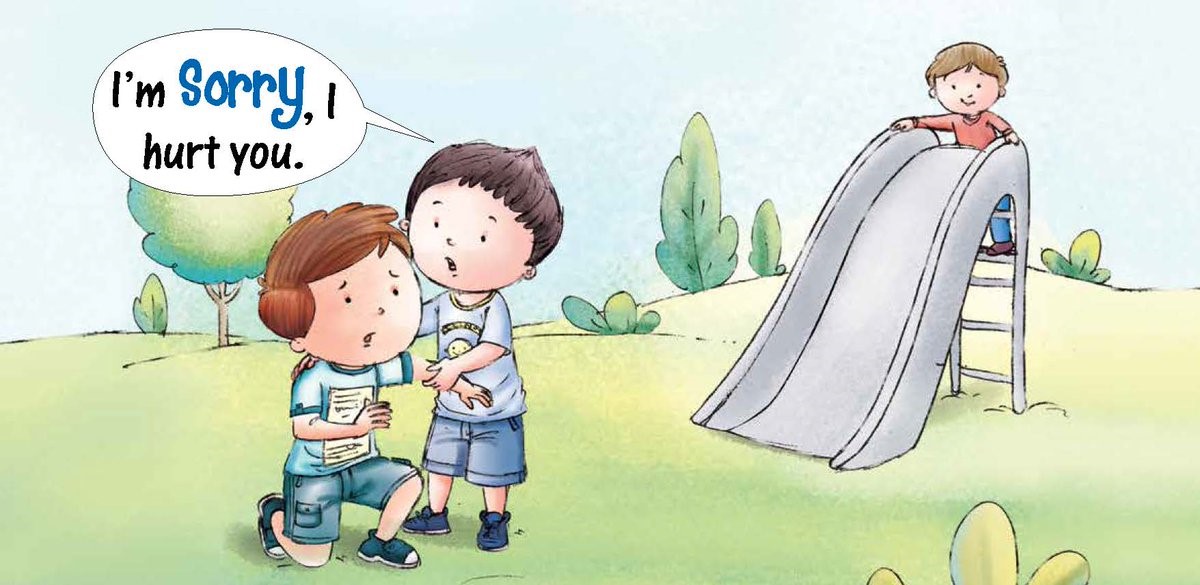Want to teach your kids the golden words "Sorry and Thank You"?

Namratha
4 July, 2018

The other day, I had taken my daughter to a function. As always, I had packed some extra snacks for her. Soon she was hungry and I gave her a biscuit. Another girl playing nearby came forward seeing the biscuit, so I offered her one too. The girl took the biscuit happily and marched away to her mom. The mom was seeing all this from her seat but chose to remain silent. What was I expecting? The joy of selflessly sharing is something else, but then a simple “thank-you” from the mom (or asking her daughter to say so) would have been nicer!
We so often come across such scenarios. Parents knowingly or unknowingly forget to teach those precious words – “thank you”and “sorry”. And this is especially overlooked in the presence of family members. How often do we say “thank-you” to our moms for cooking us endless meals day in and day out? And how often do we let our egos aside to say a “sorry”? Well, here’s the thing – when my daughter says “thank-you” for as small a thing as cooking her favorite dish, it feels so good! And a cute “sorry” just melts the heart!

But then, how do we teach them to utter these truly golden words? Here are a few ways to help make “thank you”, “please” and “sorry” a part of their vocabularies!
Walk the talk – Kids always learn the most from parents firsthand. If we show gratitude often, they will learn to do so too. Say “thank-you” often - when he picks his toys, when she helps with the chores, even for a small task like switching on the lights or handing over your phone! When you want them to do something, make it a request. A “Could you please clean-up your room?” will probably get a better response than a plain order of “Clean your room!” When you make a mistake, be it a small one; always make it a point to apologize!
Thank your own parents - A cousin of mine thanks her mom every day for the meal she cooks. Every single day! How nice is that! I’ve learnt from her to thank my mom more often now. And when my daughter sees this, she does the same! When we cook something special for her, she automatically chirps in a cute “thank you” which in itself makes my day!
Extend the same rules outside –When guests visit; they usually bring something special for the kids. And kids are a curious lot. They are more excited in seeing what they got, and the much needed gratitude is often forgotten! Remind them each time to thank the person for the gift. Let it become a habit for them.
Everyone deserves thanks- We meet so many people day in and out, who often give little tidbits to kids. The store owner gives a chocolate; the neighborhood aunt gives a cookie. These little things often go unnoticed. It seems a very normal thing to grab the treat and gulp it down for a child. A quick thanks before proceeding does wonders to the mood of the person receiving it!
Accepting compliments – When a little kid goes around, you get to hear a lot of compliments – “Oh, you are so cute!”, “Your dress is very pretty!”, “You are so smart!” These compliments deserve a thank you too! Teach them to accept compliments in a modest way by saying a “thank-you”!

Sorry – Saying thanks might be easier than apologizing for one’s mistake. Teaching kids to apologize for their behavior is not an easy task. Here are a few points that may help -
Let go of your ego – Very often, we find it tough to say “sorry” to our kids, because we are elder to them and assume we are right! Just because they are little doesn’t mean their feelings are ignored. If you hurt them, you owe them a sorry! Even if it is a small mistake, look them in the eye and apologize. That is how kids learn too, isn’t it?
Teach them to express – When my daughter hurts us, she feels bad, but is probably not sure how to express it. Instead of saying she is sorry, she cries and runs away. Kids need to be taught to express their feelings. Allow them to talk about why they did so, how they feel and what would be the right way to express it.
Role play – This is probably the best way to teach them. Instead of punishing, recreate the scenario and ask what they could do instead. Or switch roles and let them be at the receiving end. Let them understand the difference between hurting and leaving, and apologizing for one’s mistakes!
Lastly, give them time to learn– Do not force them to say “sorry’ for the sake of it. Kids take lot of time to learn how to express their feelings. A sorry or thanks cannot be forced. Be kind, polite and down to earth. They will automatically learn to use these often ignored phrases in their everyday lives!
School List
The Logos are the copyright of the respective brands. HelloParent does not intend to claim any rights over them.The logos are used for listing purposes only
© 2022 Paniya Technologies P Ltd. All rights reserved.
